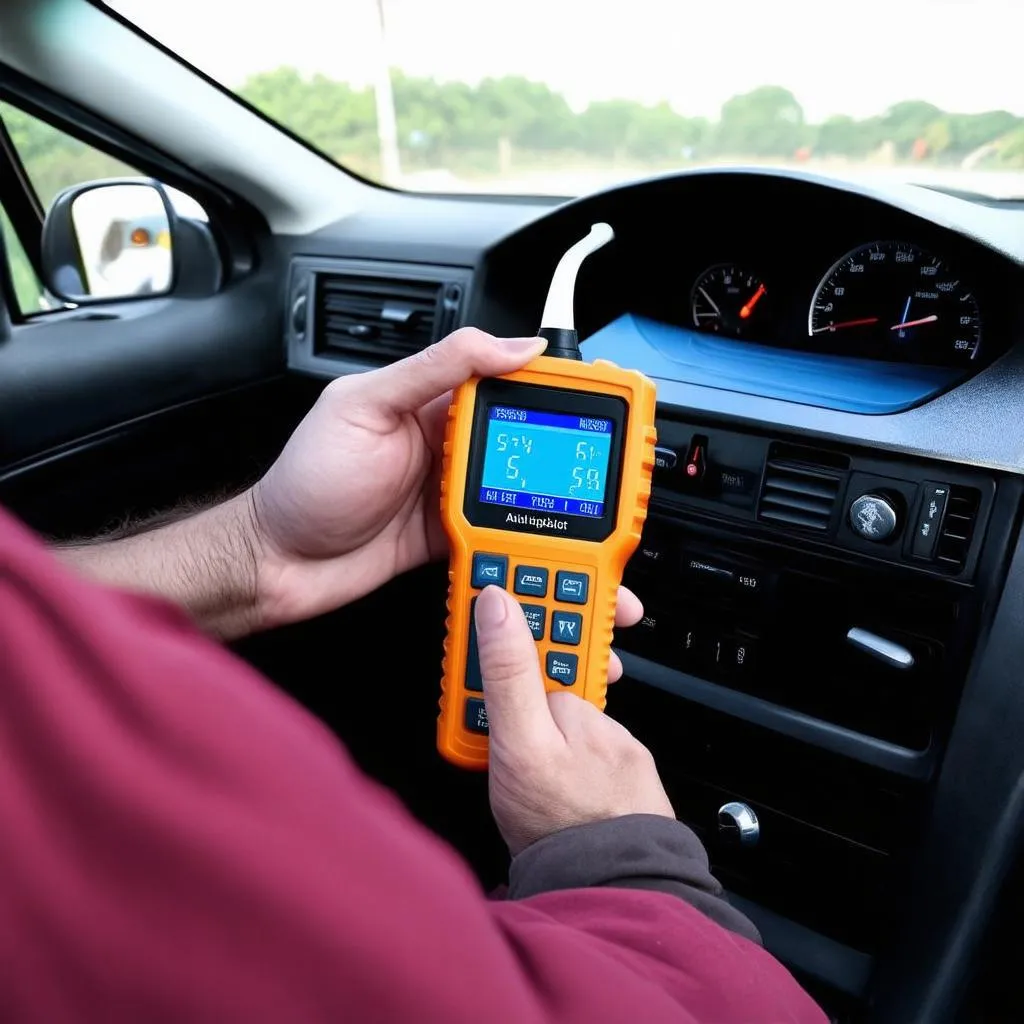Have you ever been cruising down the highway, enjoying the cool air from your AC, when suddenly, it starts blowing hot air? You pull over, check the AC settings, and everything seems to be in order. You might be wondering, “Is it time to call a mechanic or is there something I can check myself?”
What Does an OBD Tester Do?
An OBD tester, also known as an OBD scanner or code reader, is a device used to connect to your car’s onboard diagnostics system (OBD). This system is essentially a computer that monitors and controls various aspects of your car’s performance. OBD testers can read diagnostic trouble codes (DTCs) which are stored by the car’s computer when a malfunction is detected. These codes can help you identify the problem and understand what needs to be repaired.
Can an OBD Tester Diagnose Air Conditioning Issues?
The short answer is: Not always.
While an OBD tester can sometimes identify issues related to the air conditioning system, it doesn’t always provide a complete picture. Here’s why:
How Air Conditioning Systems Work
An air conditioning system is a complex combination of mechanical and electrical components. Some components, like the compressor, are monitored by the OBD system and might trigger a DTC if they malfunction. However, other components, like the refrigerant levels or the evaporator, may not be directly monitored by the OBD system.
Limited Scope of OBD Testing
OBD testers are primarily designed to diagnose problems related to the engine, transmission, and emissions systems. While they can sometimes identify issues related to the air conditioning system, their scope is limited to the electrical components that are directly monitored by the car’s computer.
Other Factors to Consider
Beyond electrical issues, there are several other factors that can affect your air conditioning system, including:
- Refrigerant levels: Low refrigerant levels can lead to poor cooling performance.
- Leaking refrigerant lines: A leak in the refrigerant lines can cause the system to lose refrigerant over time.
- Clogged filters: A dirty cabin air filter can restrict airflow and reduce cooling performance.
- Faulty blower motor: A malfunctioning blower motor might prevent air from circulating through the cabin.
- Blocked air vents: Blocked air vents can restrict airflow and reduce cooling performance.
Remember: Even if your OBD tester doesn’t show any errors related to the air conditioning system, it’s still possible there’s a problem with your AC.
How to Troubleshoot Air Conditioning Problems
If your air conditioning is not working properly, you can try these troubleshooting steps:
- Check the refrigerant levels: If your refrigerant levels are low, you’ll need to have them refilled by a qualified technician.
- Inspect the refrigerant lines for leaks: If you suspect a leak, you’ll need to have it repaired by a professional.
- Check the cabin air filter: A dirty cabin air filter can restrict airflow. Replace the filter if it’s dirty.
- Check the blower motor: If the blower motor isn’t working, you’ll need to replace it.
- Inspect the air vents: Make sure the air vents aren’t blocked.
What to Do If You Still Can’t Figure It Out
If you’ve tried all these troubleshooting steps and your air conditioning is still not working properly, it’s time to consult a qualified automotive technician. They’ll have the necessary tools and expertise to diagnose and repair any underlying issues.
Frequently Asked Questions
Can OBD testers diagnose AC refrigerant issues?
OBD testers are primarily designed to diagnose electrical malfunctions in a vehicle, and they generally don’t monitor refrigerant levels directly. While there may be some exceptions depending on the car’s specific model, refrigerant issues are usually not displayed on the OBD.
What is the best OBD tester for European cars?
There are several good OBD testers available for European cars. Some popular options include:
- OBDLink MX+: This tester is compatible with a wide range of European car models and provides advanced diagnostic capabilities.
- Autel MaxiScan MS309: This tester is another good option for European cars. It’s easy to use and provides clear and concise diagnostic information.
- Foxwell NT510: This tester is a more comprehensive tool that can be used for both diagnostics and programming. It’s compatible with a wide range of European car models.
What are the common air conditioning problems in European cars?
Some common air conditioning problems in European cars include:
- Faulty compressor clutch: The compressor clutch engages and disengages the compressor, allowing it to cycle on and off as needed. A faulty clutch can prevent the compressor from working properly.
- Leaking refrigerant lines: European cars often have complex refrigerant lines that can be prone to leaks.
- Faulty expansion valve: The expansion valve controls the flow of refrigerant into the evaporator. A faulty expansion valve can prevent the system from cooling properly.
Conclusion
While OBD testers can be helpful for diagnosing certain air conditioning problems, they are not a substitute for professional diagnosis and repair. If you suspect your air conditioning system is not working properly, it’s always best to have it checked by a qualified technician. Remember, a cool and comfortable car ride is just around the corner!
 air conditioning system check
air conditioning system check
 obd tester
obd tester
Ready to diagnose your air conditioning system yourself?
Contact our experts for help with choosing and using the right OBD tester.
Whatsapp: +84767531508
We’re here to help you keep your car running cool and comfortable!